We recognize that controversy surrounding this topic is ongoing, particularly regarding the recent paintings of the Spirit Rock. The STAR is still working to prepare our coverage of those events, and would invite anyone with thoughts or information on the subject to get in touch with us at star@houghton.edu.
2020 has been a year riddled with controversy, what with the U.S. Presidential Election looming, ongoing discussions concerning the best handling of COVID-19, and protests over racial tensions still dominating the streets of cities across the country. Small, rural Houghton has not been an exception to tensions and polarization, as disagreements have been anything but tepid, especially concerning the We Are All Houghton project recently rolled out by alumni Josh Duttweiler (’15) and Amy Coon (’14).
We Are All Houghton, presented during the alumni art exhibition RECOLLECTIVE (held September 4, 2020 to October 3, 2020 in the Ortlip Gallery), consisted of light projections of quotes by LGBTQ+ alumni around notable spots on Houghton’s Campus, including buildings like Fancher Hall, Luckey Memorial, and Wesley Chapel. Quotes came from a group of recently graduated alumni—Collin Belt (’15), Mitch Galusha (’14), Sally Jacoby Murphy (’13), Sarah Jacoby Murphy (’13), Holly Chaisson (’16), and Emilie Powles Ocock (’14)—along with some who opted to remain anonymous, including current students.
This project incorporated an anonymous survey which encouraged any person connected to Houghton College, whose sexual orientation and/or gender identity is “unaccepted by the college”, to answer and participate in. The survey served purposes twofold: one, “to allow those who would like to participate in the show in the Ortlip gallery to do so,” as select quotes would be projected in the gallery in hopes of amplifying additional LGBTQ+ voices from the school, and two, to present findings to the college after the show’s closure, so “administration can both hear from and better understand its students,” the survey form explained.
Along with the physical exhibit in the Ortlip Gallery, the project has a website, weareallhoughton.com, as well as a page on Instagram (@weareallhoughton) which currently has 705 followers (as of Monday, October 5). The website explains the background and purposes of the project, introduces the alumni involved, and links to the survey. The Instagram page portrays photographs of several of the projections as well as quotes submitted as part of the survey.
As the website explains, the project was largely in response to Houghton College’s involvement in the Supreme Court Cases regarding interpretation of Title VII and Title IX. The Supreme Court, in August 2020, concluded that firing an employee on the basis of being gay or transgender constitutes a violation of the Title VII of the Civil Rights Act of 1964. This is pertinent because it interprets that Title VII protects LGBTQ+ Employees. Houghton College’s involvement, which became known to a group of alumni in August of 2019, was as an amicus curiae. Essentially, this means that they provided insight or a perspective to the court that they might not have considered or been aware of. The position that the amici took, which included Houghton College, was that the language in Title VII (which also relates to Title IX), does not and should not include protection for LGBTQ+ employees.
After hearing of this, a group of alumni wrote a letter to President Shirley Mullen to voice their disappointment, both in Houghton’s decision to sign on the amicus brief, as well as their lack of communicating about it to current students and alumni. President Mullen responded, saying “The reason that Houghton signed the amicus brief was to say that the petitioner’s claims should be reviewed in Congress…The question at stake is whether the very best way to provide protection for LGBTQ persons is to ground that protection in the definition of ‘sex’ as that was established in Title VII and Title IX.”
The exhibit was in response to the college’s involvement in these Supreme Court cases, as well as the experiences of LGBTQ+ students at Houghton at large.
Responses have been multitudinous. Mullen shared an open letter which was posted on the school’s website (see: https://www.houghton.edu/blog/an-open-letter-from-president-mullen/). This addressed the issue and also introduced the panel which they scheduled into Homecoming weekend: Houghton Alumni Family Dinner Conversations: Learning to Discuss Difficult Topics in a Polarized Context, which was held on Friday, October 2. Duttweiler was glad that this panel was being hosted, but “was disappointed that Amy and [him], as the artists of the project would not be included in any further conversation.”
In terms of general reactions, Duttweiler and Coon expressed their overwhelmed feelings at how many positive responses they received from both participants and allies, saying they received many personal messages of gratitude for the project and, overall, received nearly 100 survey responses from LGBTQ+ current students, alumni, and staff/faculty. Duttweiler said, “their stories are heartbreaking. It’s a sobering reminder of the pain that the college’s policies have caused.”
Of the matter, Coon shares similar sentiments, but wanted to add that she was “feeling a little disappointed in the reactions of those who are looking for a theological debate,” saying the project is not about that but rather “about truly listening to those who are hurting and learning how to sit in those feelings. I hope when people hear the hurt of their community, they then ask themselves how they can help and what they can do better instead of arguing about who is right and who is wrong.”
Many of the responses from current students did take this theological approach in showing their disagreement with the project.
Cory Messerschmidt (’22) believes that the project is a direct attack on the principles of the college. “The college has a God-given duty to shepherd its students…you have to truly love someone to share the truth with them, and the individuals involved with this need to hear the truth of the biblical gospel. This is a great opportunity to love them, but instead we’ve given them a platform for their attack on the college,” he said.
Another student, Blythe Gilbert (’21), had a similar attitude, focusing more on the aspect of steering LGBTQ+ people away from “homosexuality, or any variety thereof, [which] is forbidden in the Bible.” As Messerschmidt said that Houghton should shepherd its students to the truth, Gilbert emphasized his belief that Christians are called not just to love, but to lovingly correct people to help them move closer to Christ. “To be sure, Houghton should tolerate and welcome LGBT students. I agree, certainly, that they should not be afraid to speak. However, they should not expect a Christian institution to be anything less than truly Christian.”
Students who expressed their support of the movement focused less on theological debate and arguments, and more on their gratitude for the movement, along with acknowledging the need for support and inclusion for the LGBTQ+ members of the Houghton community.
Emily Warner (’21) values the way that the project has called Houghton to act, both now and in the future. “Houghton has claimed to care deeply for its queer community. I would love for that to be true. We Are All Houghton is holding Houghton to its word—demanding that Houghton apologizes and does what it needs to ensure that queer students’ experiences are better in the future. I sincerely hope that Houghton will follow through and make concrete changes to care for and support the Houghton queer community, without feeling the need to remind us how wrong they think we are along the way.”
Skye Chaapel (’23) and Caroline Zimmerman (’24) both pointed out how the project has displayed how the LGBTQ+ community is marginalized and excluded from the overall population on campus, and thus shows the “overwhelming need for [this] representation,” as Zimmerman said. The project, in giving voices to these people, both in alumni and those currently on campus, chipped away at just that.
Another major focus of many of the supportive responses to the project was the fact that it showed the deep pain that has been inflicted on the LGBTQ+ community on campus. “There may be backlash and misunderstandings, but our classmates, friends, and people we haven’t had the pleasure of meeting yet are hurting. I just hope that from this we learn to not corner someone into some category or theological argument, but learn to listen to understand,” said Rachel Caine (’23).
If nothing else, it is clear that We Are All Houghton has given voice to those who have not always had the platform to share their experiences safely, and that Houghton’s “community” may have work to do to reconcile that term we value so much with those who have felt anything but welcomed into the community here.
Duttweiler and Coon plan to continue the project “as long as it is helpful” and are seeking feedback on how to best go about doing this in the future.
What are your thoughts on the We Are Houghton project? Angered? Validated? Comment below or get in touch with us via Instagram, Twitter, or email (editor@houghtonstar.com)!


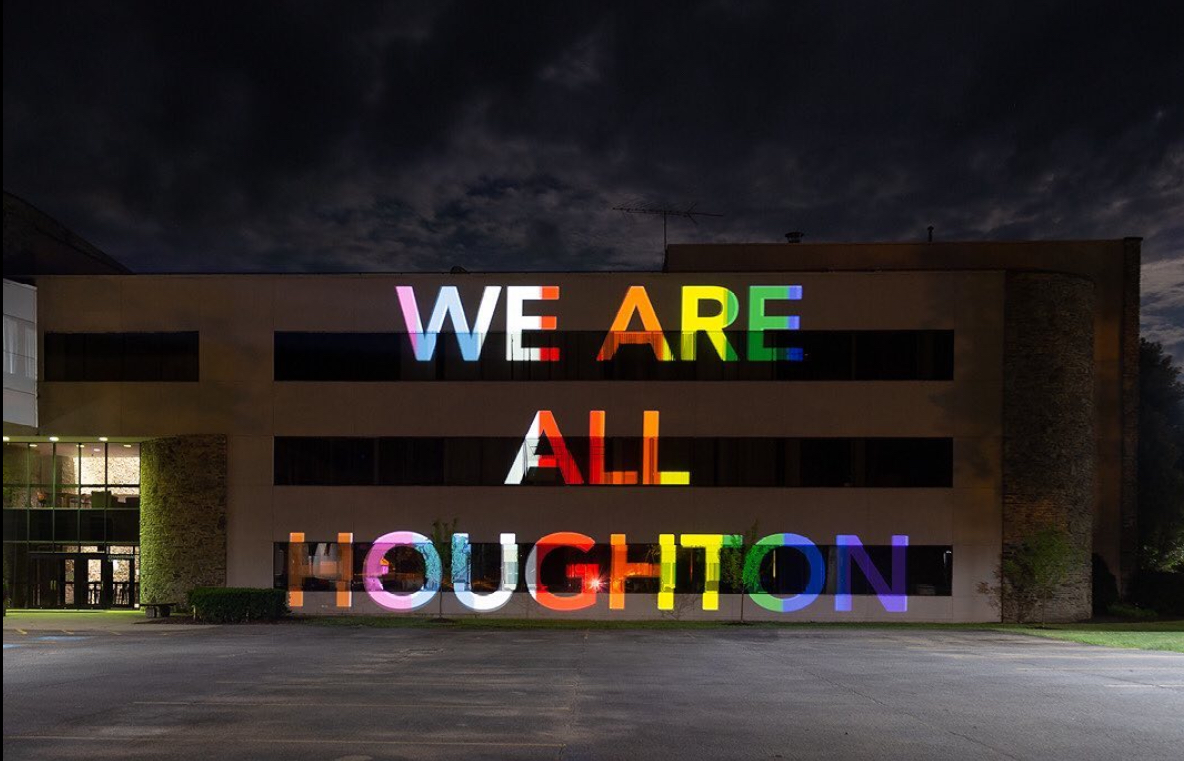
 Disney has an agenda, but that agenda is parallel to what is becoming culturally acceptable. This has never not been the case. When Andy Griffith prayed at his family’s dinner table, America generally identified as Christian, so Disney films appealed to that same sense of morality. It was the culture, and they continue to act similarly today in an environment that is less conservative. Calling it an agenda, when their platform is inspired by the climate in which they create and release content, is similar to claiming that a pastor has a religious agenda when preaching on Sundays. While it is technically true, the label means very little. Certainly anyone can come in and listen, just as anyone can go see a film, but it would be ridiculous for a non-religious visitor to hear people affirming the existence God in such a place and attempt to boycott the church. They weren’t a part of the culture of the church in the first place, even if they are invited to be. You cannot disconnect an expression from the setting in which it was conceived and created simply because it is visible to you.
Disney has an agenda, but that agenda is parallel to what is becoming culturally acceptable. This has never not been the case. When Andy Griffith prayed at his family’s dinner table, America generally identified as Christian, so Disney films appealed to that same sense of morality. It was the culture, and they continue to act similarly today in an environment that is less conservative. Calling it an agenda, when their platform is inspired by the climate in which they create and release content, is similar to claiming that a pastor has a religious agenda when preaching on Sundays. While it is technically true, the label means very little. Certainly anyone can come in and listen, just as anyone can go see a film, but it would be ridiculous for a non-religious visitor to hear people affirming the existence God in such a place and attempt to boycott the church. They weren’t a part of the culture of the church in the first place, even if they are invited to be. You cannot disconnect an expression from the setting in which it was conceived and created simply because it is visible to you. 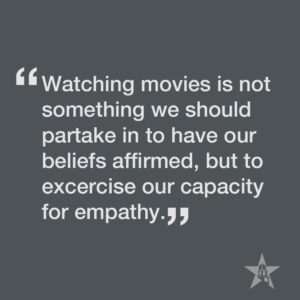 Whether or not homosexuality is a sin is not the issue. Art is meant to express the totality of the human experience and we cannot exclude an entire social group from being represented simply because their lifestyles do not align with another group’s moral convictions. Watching movies is not something we should partake in to have our beliefs affirmed, but to exercise our capacity for empathy. After all, the ability to relate to others is a muscle, something that must be trained. If we are to be like Christ then we must engage with the world the way he did, while still acknowledging the failings of humanity. This is what expression is, a way to connect and revel in the unique emotional imprints of each one of us holds within us. When we respond to popular culture as if it’s surprising that it does not live up to personal moral convictions that we all fall short of daily, then we have forgotten that.
Whether or not homosexuality is a sin is not the issue. Art is meant to express the totality of the human experience and we cannot exclude an entire social group from being represented simply because their lifestyles do not align with another group’s moral convictions. Watching movies is not something we should partake in to have our beliefs affirmed, but to exercise our capacity for empathy. After all, the ability to relate to others is a muscle, something that must be trained. If we are to be like Christ then we must engage with the world the way he did, while still acknowledging the failings of humanity. This is what expression is, a way to connect and revel in the unique emotional imprints of each one of us holds within us. When we respond to popular culture as if it’s surprising that it does not live up to personal moral convictions that we all fall short of daily, then we have forgotten that.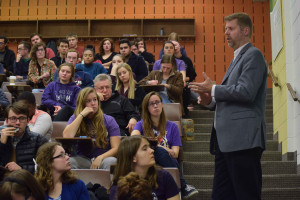
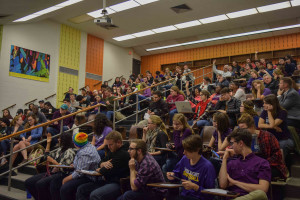
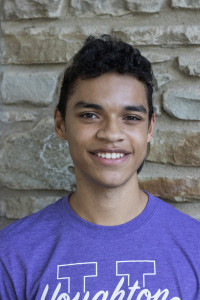
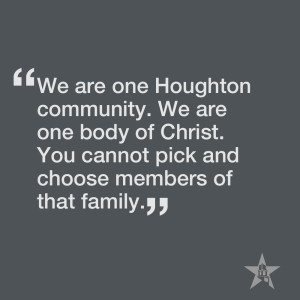 If your belief in the sinfulness of homosexuality thwarts your ability to love a gay person, you may need to reconsider your motives. Hold true to your beliefs, but for the sake of the unity of the church in a time of turmoil, please do not let the Christian acceptance of homophobia get in the way of your Christ-like compassion. You have Christian brothers and sisters who are a part of the LGBTQ+ community. Shouting at them and questioning why they would even want to attend Houghton College has done and will continue to do nothing to strengthen the church. We are one student body. We are one Houghton community. We are one body of Christ. You cannot pick and choose members of that family. We one-hundred percent need to do better. The next time you are about to slander your LGBTQ+ brothers and sisters in Christ, ask yourself when the last time you asked to pray for them was. Ask yourself whether or not you even have a gay friend. Disagree and debate, but for the beauty of the Earth, do not use your differences as an opportunity to inflict pain.
If your belief in the sinfulness of homosexuality thwarts your ability to love a gay person, you may need to reconsider your motives. Hold true to your beliefs, but for the sake of the unity of the church in a time of turmoil, please do not let the Christian acceptance of homophobia get in the way of your Christ-like compassion. You have Christian brothers and sisters who are a part of the LGBTQ+ community. Shouting at them and questioning why they would even want to attend Houghton College has done and will continue to do nothing to strengthen the church. We are one student body. We are one Houghton community. We are one body of Christ. You cannot pick and choose members of that family. We one-hundred percent need to do better. The next time you are about to slander your LGBTQ+ brothers and sisters in Christ, ask yourself when the last time you asked to pray for them was. Ask yourself whether or not you even have a gay friend. Disagree and debate, but for the beauty of the Earth, do not use your differences as an opportunity to inflict pain.
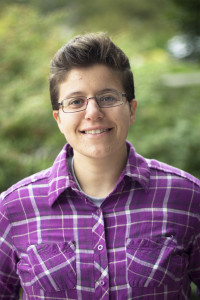
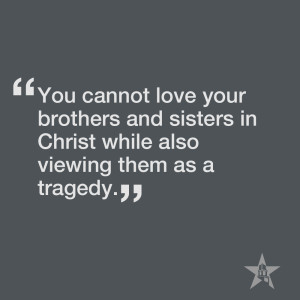 Our community tells straight couples that their sexual desires are (or can be) beautiful, holy, worthy of public celebration. Yet it tells queer couples that one of their most human qualities, the longing to become one flesh with their beloved, is to be dealt with swiftly behind closed doors. On the one hand, affirmation and love, and on the other, shame and suspicion.
Our community tells straight couples that their sexual desires are (or can be) beautiful, holy, worthy of public celebration. Yet it tells queer couples that one of their most human qualities, the longing to become one flesh with their beloved, is to be dealt with swiftly behind closed doors. On the one hand, affirmation and love, and on the other, shame and suspicion.